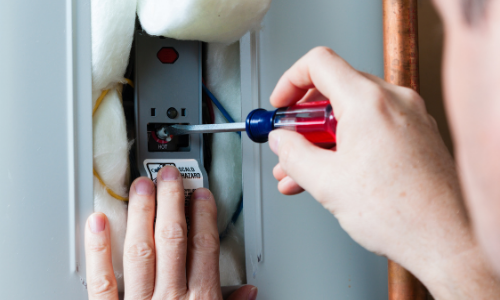They are making a few good pointers regarding Is Your Water Heater Leaking? overall in this article directly below.

A hot water heater is among one of the most essential standard appliances that can be located in a residence. With hot water heater, you do not require to undergo the stress and anxiety of home heating water manually whenever there is a requirement to take a bath, do the laundry, or the recipes. However, there is always an opportunity that your water heater would act up just like the majority of mechanical devices.
It is very important to note any little malfunction and also tackle it promptly before things get out of hand. Many times, your water heater starts to malfunction when there is a build-up of sediments as a result of continuous usage. As a precaution, periodic flushing of your hot water heater is recommended to avoid debris build-up and stop functional failure.
Usual water heater emergency situations and also how to take care of them
Inadequate warm water
It may be that the water heating unit can't support the hot water demand for your house. You could upgrade your water heating system to one with a larger capacity.
Rising and fall water temperature.
Your water heater might start creating water of various temperatures usually ice cold or hot hot. There may be a need to replace either the thermostat or the heating device of your water heater.
Dripping hot water heater tank.
In this situation, you need to transform off your water heater, permit it to cool down, and meticulously look for the source of the trouble. At times, all you require to do is to tighten a few screws or pipe links in instances of small leakages. If this doesn't function and also the leak continues, you could require to utilize the services of a professional for a proper replacement.
Stained or stinky water
You need to know if the concern is from the water or the storage tank resource when this happens. You are certain that it is your water heating unit that is defective if there is no amusing smell when you run chilly water. The smelly water can be triggered by rust or the accumulation of bacteria or sediments in the water heater container. You can attempt flushing out your tank or changing the anode if the trouble continues when you discover this. The feature of the anode is to clear out bacteria from your container. Because the anode rod substitute requires an extensive understanding of your water heating system, you will need the help of an expert.
Final thought
Some home owners disregard little warning and minor faults in their water heater unit. This just results in further damages and a feasible complete break down of your appliance. You should manage your water heater mistakes as soon as they come near stay clear of more costs and also unnecessary emergency difficulties.
With water heating systems, you don't require to go through the stress and anxiety of heating water by hand every time there is a need to take a bath, do the laundry, or the meals. It might be that the water heating unit can't support the warm water need for your home. Your water heating system might start producing water of various temperature levels usually ice cold or hot hot. If there is no funny smell when you run cool water, then you are particular that it is your water heating system that is faulty. The odiferous water can be caused by rust or the build-up of germs or debris in the water heating unit tank.
Common Water Heater Issues and What You Should Do
What Type of Water Heater Do You Have?
Before we begin it’s first important that you identify the type of water heater you have on your property. There are two main types of water heaters out there: conventional and high efficiency.
Both of these types of products typically use either gas or electricity to heat power. There are also solar water heaters that use a thermal collector on the roof or yard to heat the water.
While these models are not as common, they can cut heating costs in half. In this article, we will focus on conventional and high efficiency.
How Do My Electric and Gas Water Heater Work?
Though they look similar, electric and gas water heaters work very differently. It’s important to know their basic function because often problems can be specific to the heating source.
In the electric model, a thermostat on the side of the machine detects the temperature of the water in the tank. When the temperature needs to rise electricity flows to a heating element suspended in the water.
Gas models also use a thermostat device — typically with a mercury sensor at the tip and an additional sensor called a thermocouple. The thermocouple detects whether the pilot light is on and controls the flow of gas.
When the thermostat drops below the appropriate level gas is released which becomes ignited by the pilot light. The flame heats the bottom of the water tank which causes hot water to rise and cold water to drop.
This natural circulation continues until the water reaches the desired temperature. Then, the thermostat triggers the gas control valve to shut off the flow of gas.
What Are the Most Common Issues and How Do You Fix Them?
https://happyhiller.com/blog/common-water-heater-issues-and-what-you-should-do/

I found that content about The Importance of Water Heater Maintenance when doing a lookup on the internet. Enjoyed reading our article? Please share it. Help others locate it. Thanks for taking the time to read it.
Source